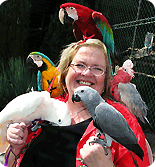Parrot Parasite

Hi, I am a new member, v glad to have found your site. Altho not a parrot owner at present I have long been a fan of these wonderful creatures. In the past I worked for many years with wild bird rescue and care in S Africa. Recently I was minding an African Grey, and was surprised to notice a pigeon fly [Hippoboscid Fly] on his back, which scurried underneath his plumage before I could catch it. I know these flies well from the many wild pigeons and doves that came my way in SA, and understood that the birds were not bothered by the flies, but I was surprised to see this on a pet bird, here in England! I believe this parrot came originally from Belgium, and is not a wild-bred bird. He grooms/chews his feathers quite a lot, and has quite rough, chewed feathers generally, tho no bald patches.
Can you explain or advise on this subject?
Many thanks
ros baillie-sparkes

Thanks for this interesting question, ros!
The Hippoboscid fly (also called a flatfly or lousefly), is actually a louse with wings. The fly is flat so that it may slide between a bird’s feathers. All lice suck blood and are very species-specific in their choice of animals to parasitize. This means that a parrot lousefly would not bother a pigeon or a crow or a person (we get our own species of lice).
Louseflies are found in birds all over the world, although, as you noted, they are rarely found on parrots kept in captivity. Of course, the biting of the lousefly can be very irritating and may be causing the bird to chew his feathers. I would also be concerned about other diseases: birds with lice often have underlying diseases which make the bird more likely to be parasitized.
I would definitely be taking this grey to your avian veterinarian for examination, diagnostic tests to determine other problems and treatment for the lice. Good luck!

































